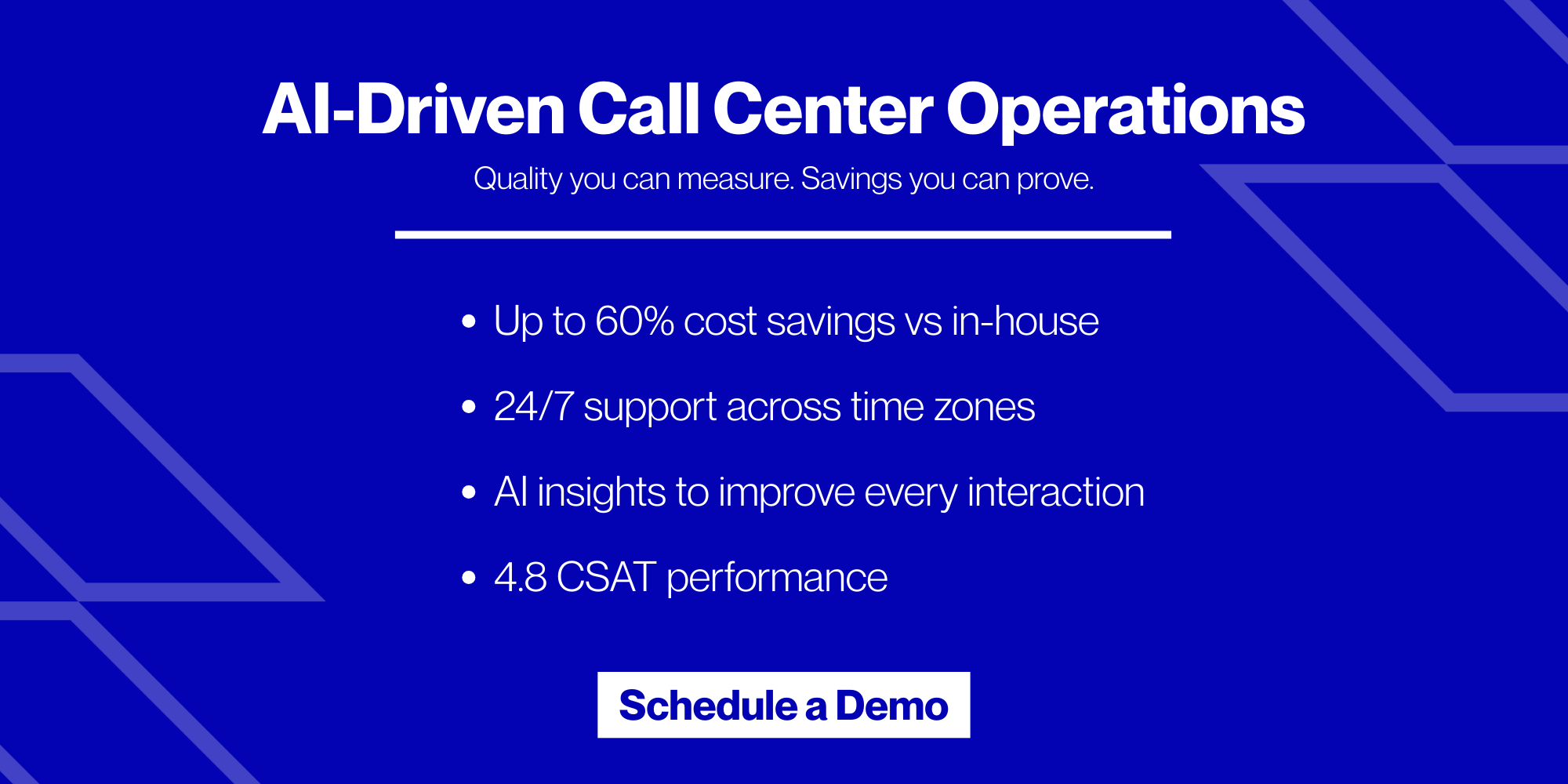Call center outsourcing means hiring another company to handle customer calls for you. Instead of answering every call yourself, you let a professional team do it on your behalf.
As your business grows, more customers will call you for inquiries and support. Handling all these calls can take up a lot of time and may impact your core operations. This is where specialized call center outsourcing companies, trusted by leading brands in the US, UK & Australia, come in.
According to Deloitte’s 2023 Global Outsourcing Survey, nearly 59% of businesses outsource customer operations to cut costs while maintaining service quality. This happens as they only pay for productive hours rather than full salaries and benefits for in-house staff.
Through call center outsourcing, you let a professional team handle both inbound and outbound calls for your business. This saves time, as you and your team can focus on running the business instead of managing customer calls. Also, most call centers have trained professionals who know how to handle customers professionally. This significantly increases customer experience (CX).
So, want to offer the best services to your customers? In this article, let’s understand what is call center outsourcing, its various types, and how it works. Also, to form a better opinion, we will check out its benefits and challenges.
What is Call Center Outsourcing?

Call center outsourcing means hiring another company to handle customer calls and messages for your business. Instead of answering calls and replying to customers yourself, you let experts do it for you.
Generally, a call center handles your:
- Incoming calls (customers asking questions or needing help)
- Outgoing calls (calling customers for feedback or sales)
- Emails and messages
- Live chats on your website
- Social media messages
Through call center outsourcing, you can ensure your customers get quick and professional responses. Also, it reduces costs compared to hiring and training your own team. That is why mid-sized and large D2C companies with $5M+ revenue often rely on outsourcing partners to strengthen CX.
What are the Various Types of Call Center Outsourcing?

There are three types of call center outsourcing (depending on where the call center is located):
1. Onshore Outsourcing (Within Your Home Country)
You hire a call center in your home country (like the US, UK, or Australia) to handle customer calls.
It is easier to manage since the company is in the same country.
Cost is usually higher than outsourcing to another country but offers better control and quality.
Example: A UK-based consumer brand outsources to a call center in London for better alignment with local customers.
2. Offshore Outsourcing (Another Country)
Also known as “call center offshoring.”
You hire a call center in another country, like the Philippines or the UAE.
This allows you to save costs because labor may be cheaper in some countries.
You gain access to a large number of trained professionals.
However, you face challenges like time zone differences and possible language barriers.
Example: A US-based e-commerce company outsources to the Philippines to support global customers.
Such outsourcing is perfect for D2C brands looking to balance cost-efficiency with service scalability, especially during peak seasons.
3. Nearshore Outsourcing (Nearby Countries)
You hire a call center in a neighboring country (like Mexico or Colombia).
It is more affordable than onshore outsourcing.
There are fewer language and time zone issues compared to offshore outsourcing.
Example: An Australian brand partners with a call center in New Zealand to reduce costs while keeping cultural alignment intact.
How Does Call Center Outsourcing Work?

Till now, you must have learned what call center outsourcing is. Now, study the steps you must follow to hire a call center outsourcing firm:
Step I: Contracting and Agreements (Making a Deal)
Before outsourcing, decide what kind of customer support you need:
- Will the call center handle only phone calls or also emails, WhatsApp, and social media messages?
- Do you need 24/7 customer support or only during business hours?
- Do you require bilingual or region-specific agents?
Once you decide, you select a call center company and sign a contract.
For example: a D2C company in California contracts a CX partner to answer calls within 20 seconds and resolve 90% of tickets on the first contact, to make sure that SLAs align with customer expectations.
Step II: Technology and Tools (How Calls Are Managed)
Call centers use advanced technology to make service faster.
Some key tools include:
- CRM Software: Stores customer details, previous complaints, and order history in one place for personalized service.
- AI Analytics: Tracks patterns in customer queries, identifies bottlenecks, and suggests improvements.
- Cloud Platforms: Enable omnichannel support across phone, email service outsourcing, chat, and social media.
Most VPs and directors in the CX industry prefer partners with proven CRM and AI integration, as it directly impacts service quality.
Step III: Performance Monitoring (To Ensure Good Service)
Once outsourcing begins, performance must be tracked using metrics such as:
- Average Handling Time (AHT)
- First Call Resolution (FCR)
- Customer Satisfaction Score (CSAT)
Progressive outsourcing partners provide transparency so CX leaders can track these KPIs in real time.
Benefits of Call Center Outsourcing

Call center outsourcing offers several benefits to businesses:
- Cost Efficiency
Deloitte’s research confirms that reducing costs remains the top driver for outsourcing. Instead of paying for office space, equipment, and staff training, outsourcing firms cover these costs. - Access to Trained Professionals
Outsourcing gives you immediate access to specialists skilled in complaint resolution, escalation handling, and customer engagement across multiple channels. - Scalability During Seasonal Demand
For D2C companies with fluctuating sales cycles, outsourcing makes scaling seamless. Managers and VPs in retail and consumer brands can increase support during holiday spikes and scale down later without workforce disruption.
Challenges of Call Center Outsourcing

- Communication Barriers – can be minimized by selecting bilingual agents.
- Quality Control – mitigated through SLAs and consistent audits.
- Data Security – a rising concern. In fact, IBM’s 2023 Cost of a Data Breach Report showed an average global cost of $4.45M per incident. Choosing a PCI DSS and GDPR-compliant partner is necessary for trust.
How to Choose the Right Outsource Call Center?

- Reputation – validated through client testimonials and third-party reviews.
- Expertise – ensure industry-specific knowledge (e.g., retail vs. healthcare).
- Technology – partners must provide omnichannel support and advanced analytics.
- Vendor Capabilities – case studies and trials are critical.
CX leaders in $5M+ companies should make outsourcing decisions with long-term growth objectives in mind, not just short-term savings.
Boost CX with Call Center Outsourcing. Let Atidiv Help You!

Trusted by Tirebuyer, Powered by Insights
Still wondering what is outsourcing call center? It’s a proven way to reduce costs, improve CX, and free up internal bandwidth.
At Atidiv, we partner with high-growth D2C brands across the US, UK & Australia, delivering results through outsourcing. Our approach emphasizes KPI monitoring, compliance and customer satisfaction.
Want to save up to 60% on operational expenses while scaling customer support? Partner with Atidiv today and gain a trusted extension of your CX team.
FAQs On Call Center Outsourcing
1. Will I lose control over customer service if I outsource?
No, you can set clear expectations through Service Level Agreements (SLAs). Also, keep monitoring performance using advanced analytics and provide regular feedback to your outsource call center.
2. How do I ensure data security when outsourcing?
Choose a call center with strict security protocols like:
- Encryption
- Access controls
- Compliance with applicable laws and regulations
Always sign a confidentiality agreement and ensure they have a proven track record in handling sensitive customer data securely.
3. What if the outsourced agents don’t understand my customers?
Ideally, you should always opt for a call center with experience in your industry. Also, to eliminate language barriers, request bilingual or culturally aligned agents from your provider.
Lastly, provide training to the call center agents on your brand’s tone, policies, and customer expectations.
4. Is outsourcing cost-effective for small businesses in 2025?
Yes, outsourcing helps you to reduce overhead costs. There is no need to pay for:
- Office space
- Salaries
- Agent training
Many call centers even offer flexible pricing models. So, you only pay for what you use. This further saves you costs.

